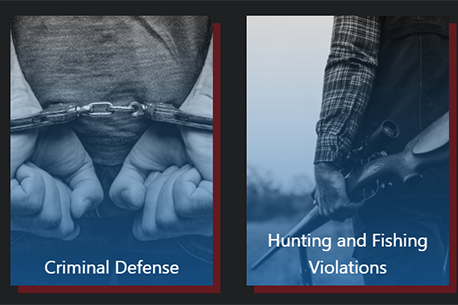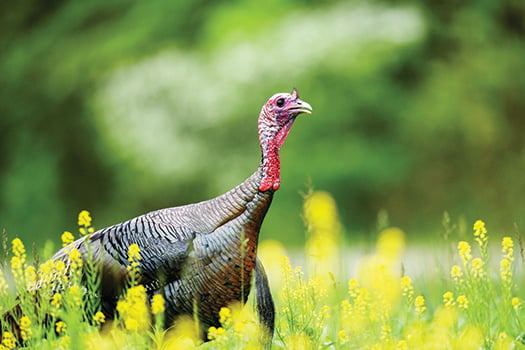Protect Your Rights to Hunt and Fish – Outdoor News

Most people facing a hunting or fishing violation are more concerned about losing their rights to hunt and fish than they are about going to jail. Many hunting and fishing violations come with a possible jail sentence. But, most first-time offenders do not need to be too concerned with spending time behind bars. Without a doubt, jail-time can be on the table even for a first-time offender if the offense is particularly bad. However, according to Michigan Criminal Defense Attorney John Freeman, a more likely consequence of a hunting and fishing violation is the loss of hunting and fishing rights for up to several years, and a misdemeanor conviction on your record.
Welcome to the first in a series of articles on legal topics that are important to sportsmen and women who appreciate their rights to hunt and fish in Michigan. The goal of this series is to keep you informed and protect your rights to hunt and fish by addressing the most common questions and topics that come up when people reach out to Michigan’s leading Hunting and Fishing violations attorney John Freeman for help. Today, we will cover Michigan’s Trespass laws and address some addition issues that regularly confront hunters and fishermen in Michigan.
TRESPASSING IN MICHIGAN
One typical scenario involves when you can and cannot enter onto someone else’s land, particularly to get to your tree stand or to recover a deer. Such situations involve Michigan’s Trespass laws. Trespassing is a common mistake made by hunters in Michigan. Hunters wishing to cross a property line, MUST receive written or verbal consent from the owner or leaseholder of the property they wish to enter. These regulations still apply to tracking a wounded animal onto another property. If you are going to hunt adjacent to private property, it is a best practice to contact neighboring property owners in advance of the hunting season and introduced yourself and seek permission to track a wounded animal if the time comes. That way, you can save yourself the trouble of trying to find the landowner on the day you may need to track a wounded deer or other game. Also, offer to help your neighbor if they ever need to track an animal on your property.
Failure to obtain permission can lead to unpleasant encounters or worse, an arrest and prosecution for a criminal trespass. Of course, your neighbor has the right to refuse entry onto their property. In that instance, you must not enter their property for any reason. To me, that is an incentive to return to the range and become a better marksman and learn to make the shot that will drop the animal in its tracks or make a long retrieval across the property line unnecessary.
Hunters WITHOUT a firearm are permitted to walk, or run onto a person’s property ONLY for retrieving their hunting dog, unless the owner has previously objected to them doing so. A hunter may not stay on said property past the reasonably time needed to retrieve their hunting dog.
Common Issues Confronting Hunters
People often wonder what are some of the most common issues confronting Michigan Hunters?
Michigan’s hunting laws cover anything from the time of day you can harvest an animal, to how much ammunition you can load into your firearm. Regulations are generally tailored to the specific activity, or animal you are hunting. No matter the animal you are hunting, hunters in Michigan collectively must be aware of the following regulations. Most can be found in various hunting digests published by the DNR each year.
- Licensing and Permits: Hunters in Michigan are required to obtain appropriate licenses and permits before engaging in hunting activities. Different licenses are available for various types of game, such as deer, turkey, waterfowl, small game, etc.
- Hunting Over Bait-Lower Peninsula: In Michigan, “baiting” and “feeding” whitetail deer is BANNED in the entire lower peninsula, regardless of hunting on private land. “Bait” is defined by the DNR as, “a substance intended for consumption by deer composed of grains, minerals, salt, fruits, vegetables, hay or any other food materials used as an aid in hunting.” The term “Feed” is defined by the DNR as, “a substance composed of grain, mineral, salt, fruit, vegetables, hay or other food material that may attract deer or elk for any reason other than hunting.”
- Seasons and Bag Limits: The Department of Natural Resources establishes specific seasons as well as possession limits, for different game animals including deer, turkey, waterfowl, small game, etc.
- Hunting Zones: The DNR also establishes different zones of hunting. For example, what is commonly referred to as the “rifle line” distinguishes the border from the southern part of the state, and the northern part of the state. This border represents the area in which you may use certain calibers for taking whitetail deer. If you are south of the rifle line, the most noteworthy restriction for deer hunters is being limited to “A .35-caliber or larger rifle must be loaded with straight-walled cartridges with a minimum case length of 1.16 inches and a maximum case length of 1.80 inches.” Note that this is one of the many restrictions regarding hunting zones in Michigan.
- Hunter Safety: Hunters must be aware of the regulations that ensure the safety or yourself, and others. Hunters must be aware of the seasons that they are required to wear hunter’s orange which often vary between the species of animal that you are hunting. Not wearing hunter’s orange during gun season, even on private property in a blind, is a misdemeanor! Safety regulations also apply to where you are allowed to take a game animals. This includes maintaining a minimum of 450 feet of an occupied building, dwelling, house, residence, cabin, barn or another building used for operating a farm without receiving the written permission of the property’s owner, renter or occupant.
Note that this list of regulations does not cover every regulation within the state of Michigan. Hunters must educate themselves on the rules in order to avoid unnecessary charges. Ignorance of the law is not an excuse!
Snagging Fish
People often wonder: Can I snag a fish? In Michigan, the DNR defines snagging as “Taking or attempting to take a fish in a manner or methods where the fish does not take, or have the chance to take, the hook voluntarily in its mouth. Snagging shall include, but not be limited to, fishing by manipulating a hook or hooks and other tackle or lures, whether baited or not, in such a manner as to pierce or hook a fish in any part of the body, circumventing the voluntary action of the fish to take the bait or lure in the mouth.” It is important to note that snagging DOES include UNINTENTIONALLY hooking a fish anywhere other than the fish’s mouth. Failure to adhere to this rule could result in hefty fines and jail time.
For more on snagging fish, watch our YouTube video.
How Do I Handle an Encounter with Law Enforcement?
Many people ask, “What do I do if I am confronted by law enforcement when hunting or fishing”? This includes a DNR Conservation Officer, who most people believe have the most power of any Michigan law enforcement officer. First and foremost, be polite and non-threatening. If armed, make it crystal clear that you do not pose a threat and comply with whatever instructions you are given to ensure everyone’s safety. This does not mean, however, that you must answer questions.
Law Enforcement officers often ask questions claiming to “just want your side of the story so we can work this out, avoid a ticket, and go home”. The problem is that law enforcement officers are allowed to lie to you to get you to make an incriminating statement. Not knowing the true motive of the law enforcement officer makes the default rule clear – if you are confronted by law enforcement, DON’T TALK! You have the right to remain silent, USE IT! Even if you believe you have done nothing wrong, assert your rights and wait to speak with your attorney before conversing with law enforcement. Avoid the temptation to explain. If the officer genuinely wants your side of the story, the officer will wait until after you have spoken with your attorney. Protect your rights and contact an experienced outdoor violations attorney who understands hunting and fishing. Your ability to hunt and fish in the future may depend on it.
About Michigan Criminal Defense Attorney John Freeman
Mr. Freeman has more than 30 years or experience and handles all types of criminal cases in state and federal courts throughout Michigan. As part of his practice, Mr. Freeman has become Michigan’s leading criminal defense attorney for hunting and fishing violations. He has been an avid outdoorsman for over 50 years, and he knows the importance of being able to hunt and fish in the beauty of the great outdoors. With decades of experience in the criminal justice system, Mr. Freeman knows the importance of paying close attention to the rules and regulations that encompass the world of hunting and fishing. If you fail to follow the rules, you could lose your right to hunt or fish, pay substantial fines, and even end up spending time in jail.
If you or a loved one are facing a hunting or fishing violation, or any other type of criminal investigation or prosecution, contact attorney John Freeman through his web-site or by calling 248-422-1499, and be sure to mention Michigan Outdoor News. Also, please contact us if you have a specific topic or question you would like us to address in an upcoming edition. To learn more about attorney John Freeman’s outdoor adventures, check him out on YouTube.
Source: https://www.outdoornews.com/2024/05/07/protect-your-rights-to-hunt-and-fish/







